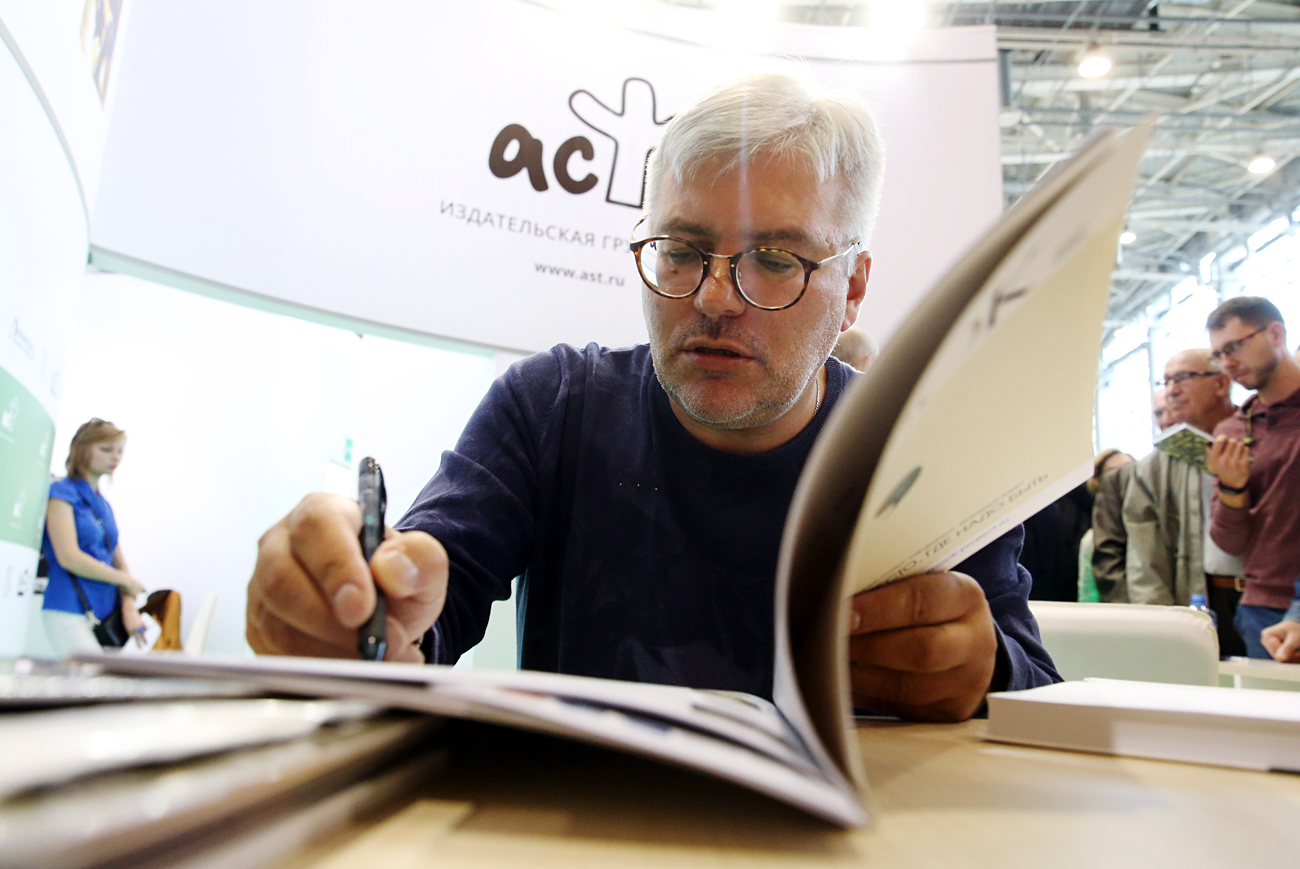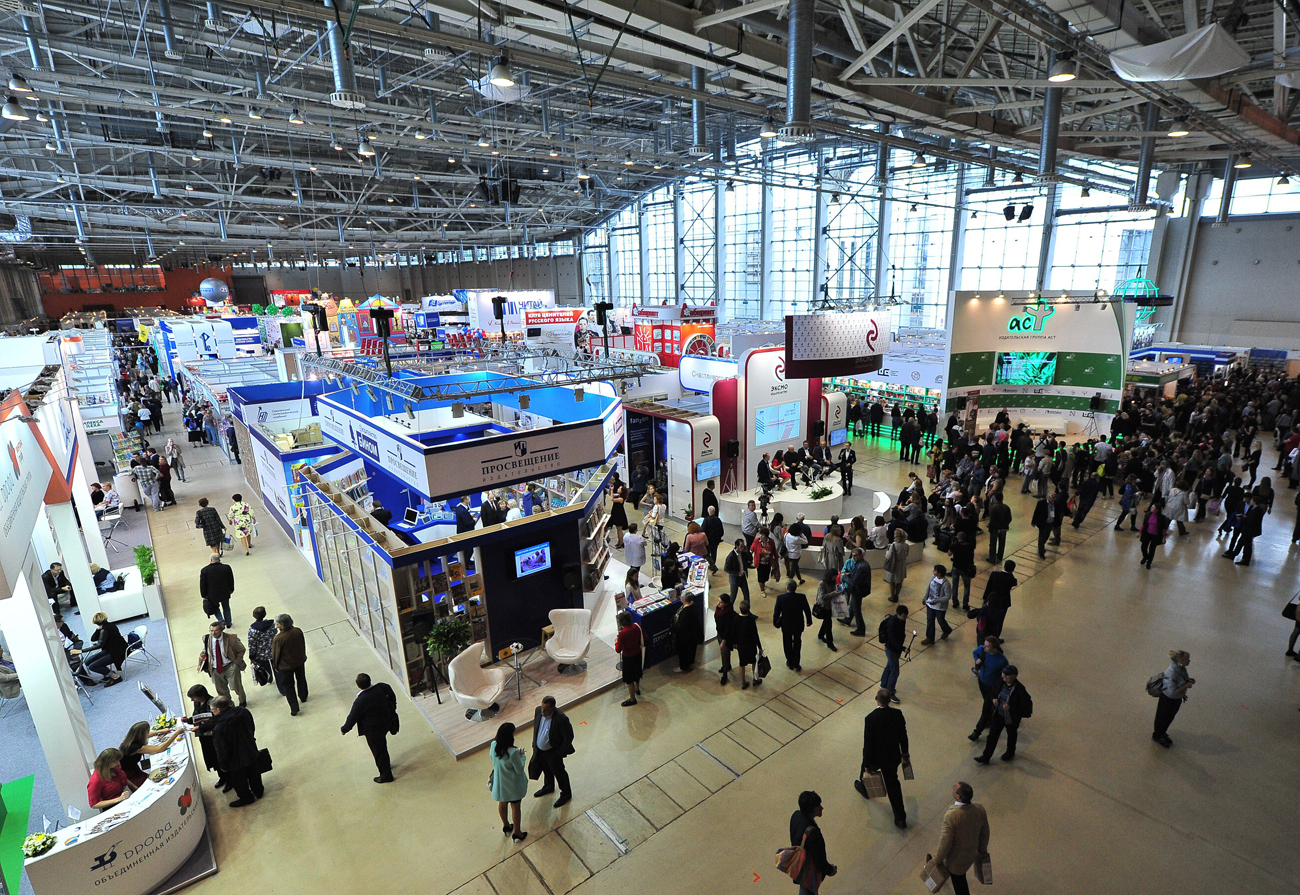
People attend the 29th Moscow International Book Fair at the VDNKh Exhibition Center.
Vyacheslav Prokofyev/TASSFrom Sept. 7-11, publishers, editors and journalists gathered along with some of Russia’s best-known authors, inside a 70,000 square-foot glass-walled exhibition hall in Moscow’s VDNKh to take the pulse of Russia’s literary life at the Moscow International Book Fair (MIBF). Just over 100,000 visitors took part in the event, which featured more than 500 seminars, workshops and readings.
MIBF plays an important role in introducing international critics and agents to contemporary Russian writers and promoting new translations of Russian works.
Editor of the Asian Review of Books Peter Gordon, who lives in Hong Kong, was one of several overseas visitors at MIBF who appreciated the literary insights it provided: “It can be hard to know what is going on in the Russian world of writing and books…” he said. “A visit to the Moscow International Book Fair pulls back the curtain a little.”
One of the high points for Gordon was meeting Guzel Yakhina, a Russian novelist of Tatar origin whose novel Zuleika Opens her Eyes won Russia’s Big Book prize last year. Talking to Yakhina was “a highlight — at least for those interested in Russia's Asian heritage and connections…” Gordon said.
Yakhina seems almost taken aback by the novel’s success internationally. “I was just telling a story about a Tatar woman,” she said, adding “I hope it will be interesting because it is not just a historical story; it is also a human story … I hope these topics — love for children, female love, love for strangers, for enemies — are also important for people today.”
Medieval historian Eugene Vodolazkin’s novel Laurus about the life of a 15th-century Russian monk was also a surprise bestseller in Russia and abroad. “I was sure no one would buy and read it except my wife and friends,” Vodolazkin said.
 Eugene Vodolazkin at MIBF. Source: Vyacheslav Prokofyev/TASS
Eugene Vodolazkin at MIBF. Source: Vyacheslav Prokofyev/TASS
Laurus won the Big Book Prize in 2013 and appeared last year in Lisa Hayden’s inspired English translation, which won this year’s Read Russia prize for translation. Vodolazkin’s new novel, Aviator, shortlisted for this year’s awards, is the story of a man who wakes in hospital to find he has forgotten everything and gradually reconstructs his memories in a journal.
Hayden, who is now at work on a translation of Aviator (as well as of Yakhina’s novel, which should be published in English in 2018), describes Vodolazkin’s novels, in her blog Lizok’s Bookshelf, as examining the nature of “history … and time.”
Yakhina and Vodolazkin are two of the growing number of contemporary Russian novelists who use historical settings to mirror the present day. Elena Shubina, who first published these and other authors, said that the new novels “are not historical.” “They are about modernity,” she said.
Vodolazkin agrees: “Writing about the fifteenth century – or the 1930s and ‘40s – I try to solve modern problems,” he said.
Vodolazkin says that Aviator ultimately shows the importance of the small personal histories that run parallel to major events, adding: “Personal consciousness is the only thing we have to counteract authoritarianism.”
Former journalist Dmitry Glukhovsky is one of many contemporary writers who carries present day challenges over into a dystopian future. Glukhovsky began his cult series, set in the post-apocalyptic disused tunnels of the Moscow metro, online in 2002. Metro 2033 and its sequels have since had phenomenal success and been widely translated.
The first book in the trilogy satirised the 1990s, (“life in the ruins of an empire,” as he explained), whereas the third book, Metro 2035, relates to the situation 20 years later. “The eagerness of society to believe that Ukraine has been taken over by Nazis,” is represented metaphorically by the novel’s characters, Glukhovsky said, “still hiding in their nuclear bunker, refusing to come out because they believe their world has been destroyed.” Glukhovsky’s next novel will have a spiritual element, an existential crime drama that presents a factual portrait of today’s Moscow.
Glukhovsky, whose inspirations include Kafka and Marquez, also talks about the need to balance Russian and international themes: “I see myself as a global citizen, but I am not trying to deny my roots.” Of his Metro series, he says “although there is a Russian flavor, it is also a pan-European story, dealing with the legacy of the 20th century.” The series has inspired volumes of official fan fiction, set in the same invented universe and written by authors from around the world. Glukhovsky describes the ongoing project as a piece of “beautiful, cross-cultural cooperation.”
 75th pavillion of VDNKh. Source: Sergey Kiselev/Moskva Agency
75th pavillion of VDNKh. Source: Sergey Kiselev/Moskva Agency
The work of getting modern Russian writing into the hands of global readers falls in part to translators.
“Translators do more for mutual understanding than any political people; the act of the translator is a heroic act,” said Eugene Reznichenko, executive director of Russia’s Institute of Translation speaking just before the start of a packed meeting to discuss “Translation as an art of Literary Diplomacy.”
Participants at that discussion included Jürgen Boos, director of the Frankfurt Book Fair, which is celebrating its 60th anniversary. Reznichenko’s institute has funded the translation of more than 640 titles so far on a variety of themes: “Russian culture is a sort of mosaic,” he said; “readers can see different pieces of the puzzle.”
Vodolazkin, who admires several Anglophone authors, such as Julian Barnes and Jonathan Franzen, feels that the success of Russian writers in translation depends on a balance, saying of Dostoevsky “he has enough European form to be clear to the western reader, but he is exotic enough to be interesting.”
Eugene Reznichenko describes the current era as a new golden age in Russian literature. “There are currently many different writers … with different views, but they are all talented — some may even be geniuses,” Reznichenko said. And fresh models for promoting this brilliant new writing are emerging fast.
Glukhovsky’s road to success — publishing his work free online and then finding an enthusiastic paying audience — is one such model. “Literature is not about sales,” Glukhovsky said; “publishing is about sales. Literature is about spreading ideas and conquering hearts.”
All rights reserved by Rossiyskaya Gazeta.
Subscribe
to our newsletter!
Get the week's best stories straight to your inbox